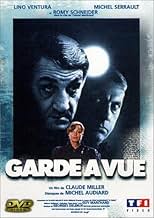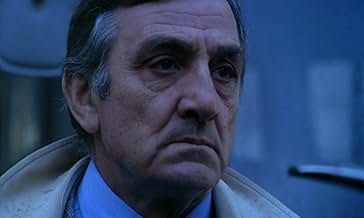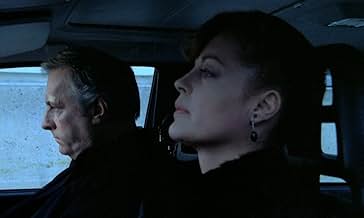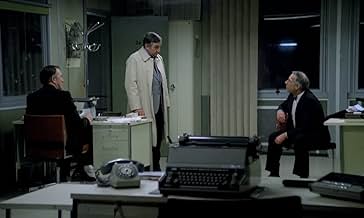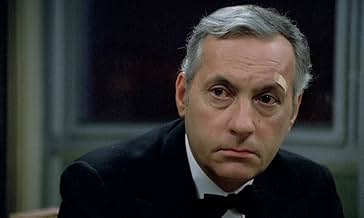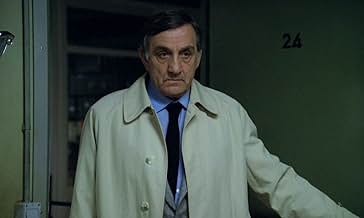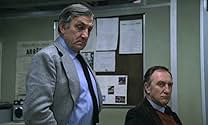IMDb-BEWERTUNG
7,6/10
5856
IHRE BEWERTUNG
Ein Polizeiinspektor, der einen Anwalt zweier Sexualmorde an Kindern verdächtigt, lässt ihn zu einer stundenlangen Vernehmung vorladen.Ein Polizeiinspektor, der einen Anwalt zweier Sexualmorde an Kindern verdächtigt, lässt ihn zu einer stundenlangen Vernehmung vorladen.Ein Polizeiinspektor, der einen Anwalt zweier Sexualmorde an Kindern verdächtigt, lässt ihn zu einer stundenlangen Vernehmung vorladen.
- Auszeichnungen
- 6 Gewinne & 5 Nominierungen insgesamt
Mohammed Bekireche
- Arab
- (Nicht genannt)
Claude Carliez
- Un policier
- (Nicht genannt)
Empfohlene Bewertungen
Inspector Antoine Gallien (Lino Ventura) is a no non-sense and practical man who only believes in facts and evidence, and is assigned on the New Year 's Eve to question a wealthy tuxedo-wearing attorney named Jerôme Martinaud (Michel Serrault), suspected for the rape and murder of two little girls. There's no real evidence against him except that he was near the locations where the victims were found. So, because he was at the wrong places, at the wrong moments, he naturally falls "under suspicion" (a wink to the US remake's title).
"Garde à Vue" has only four main characters, the two leads plus Gallien's colorful assistant Marcel Belmont (Guy Marchand) and Martinaud's cold and sophisticated wife (Romy Schneider in her next to last role). And through a short running-time of eighty something minutes and a very austere setting such as the commissariat of a French small town, the whole movie consists on a long questioning session where Gallien tries to establish Martinaud's alibi, if he ever has one. Needless to say that both actors are perfect: Ventura plays the determined and competent cop with a bluffing realism, and Serrault's nervousness and confusion, powerful convey the idea of a man who's not acting natural. It takes some super-human acting strength to naturally play a non-natural character. As the session progresses, it becomes obvious that Martinaud can't afford an alibi, yet it's also obvious that Gallien doesn't want to be misguided by this obviousness.
And in fact, even the film seems to be governed by a sort of deliberately misguiding impression, as if it was manipulating us like Martinaud seems to manipulate his audience. Indeed, "Garde à Vue" strikes by an astonishing minimalism: It's a film of a few words, a few scenes, a few actors, but each of these elements is perfect and doesn't ask for more. Directed by Claude Miller and written by one of the greatest French screenwriters, Michel Audiard, "Garde à Vue" is a film that meticulously concentrates all the elements of greatness that make the best cop/thrillers and elevate it to another dimension. More than a cop/thriller, "Garde à Vue" is a remarkable character study where the flaws of its main character are highlighted by a confrontation with a totally opposite personality. We look at Martinaud from Gallien's perspective, then from his wife's, and we try to find out by ourselves not if he's guilty or not guilty but what kind of man, he really is.
Like another minimalist masterpiece, "12 Angry Men", "Garde à Vue" is an intelligent introspection into the way human personalities from different backgrounds can interact in their quest for facts and truths. How intelligence and the conscience of one's own failure and mediocrity can work as a mask to disguise emotions. And the film is full of them, the questioning starts in a very polite way. Progressively, Martinaud expresses his displeasure to be taken in an interrogation room while everyone celebrates the New Year's Eve. But he's incapable of providing an alibi, and therefore slips into the suspect n°1 category. Belmont believes he's guilty and tries to get the confession the easy way, by slapping Martinaud around when Gallien is absent. But it doesn't work, Martinaud oscillates between a state where he asserts his rights and others where he falls in his miserable condition, convinced that he's only accused by people because they're as mediocre as him and can't stand the idea of a mediocre man succeeding.
And 'mediocre' is an epithet that fits Martinaud, thanks to Serrault's magnificent capability to play ambiguous and double-faced characters. He masterfully embodies this category of men, apparently successful and wealthy but living a totally miserable life, they're by essence misleading persons, because their very lives give the wrong impression. The film embarks us in a succession of facts and sordid details about Martinaud's marital life incarnated by a long corridor between him and his wife, it's not infidelity, not impotence, but it's pure nothingness. Martinaud's sexual tendencies, pointing a more and more accusing finger, are the reasons behind the failure of his marriage, but Gallien still can't see where this is leading. He feels he's being manipulated by emotions, not realizing that these emotions can give serious clues about Martinaud's eventual motives. But he's afraid of having wrong impressions and desperately asks for an alibi and a confession. But how can you ask such a clear question to a man so full of contradictions. In a way, Gallien is manipulated by his own fear of being manipulated.
That's the masterstroke of Michel Audiard, the film doesn't let itself embark by obviousness, there are facts, there are motives, there are proof but human relationships predominate above all these considerations. And even a practical man like Gallien can get the wrong impression, even from facts.. The writing and the editing, swinging back and forth between the interrogation, the crime settings and Martinaud's background create the enthralling feeling of a puzzle whose pieces reassemble. But it's the kind of puzzle that you only know the picture after reassembling them, you can't have a clear idea even when you come close to the heart-pounding conclusion. And the acting and directing contribute to a very realistic feel. The interrogation room is not too threatening, there's not a suffocating atmosphere aggravated by a terrorizing inspector. No, Gallien is relatively calm and tolerates Martinaud's outbursts with an impressive patience. Everything is handled as humanly as possible.
The film won four deserved César (French Oscars) for Best Actor (Serrault), Best Supporting Actor (Marchand), Best Editing and Best Writing. I was surprised to see that Lino Ventura wasn't nominated because his performance made of calm and quiet strength was not only spectacular in its nuance but indispensable not to let the film become caricatural. Never mind, every single element works perfectly and it's one of the greatest French thrillers.
"Garde à Vue" has only four main characters, the two leads plus Gallien's colorful assistant Marcel Belmont (Guy Marchand) and Martinaud's cold and sophisticated wife (Romy Schneider in her next to last role). And through a short running-time of eighty something minutes and a very austere setting such as the commissariat of a French small town, the whole movie consists on a long questioning session where Gallien tries to establish Martinaud's alibi, if he ever has one. Needless to say that both actors are perfect: Ventura plays the determined and competent cop with a bluffing realism, and Serrault's nervousness and confusion, powerful convey the idea of a man who's not acting natural. It takes some super-human acting strength to naturally play a non-natural character. As the session progresses, it becomes obvious that Martinaud can't afford an alibi, yet it's also obvious that Gallien doesn't want to be misguided by this obviousness.
And in fact, even the film seems to be governed by a sort of deliberately misguiding impression, as if it was manipulating us like Martinaud seems to manipulate his audience. Indeed, "Garde à Vue" strikes by an astonishing minimalism: It's a film of a few words, a few scenes, a few actors, but each of these elements is perfect and doesn't ask for more. Directed by Claude Miller and written by one of the greatest French screenwriters, Michel Audiard, "Garde à Vue" is a film that meticulously concentrates all the elements of greatness that make the best cop/thrillers and elevate it to another dimension. More than a cop/thriller, "Garde à Vue" is a remarkable character study where the flaws of its main character are highlighted by a confrontation with a totally opposite personality. We look at Martinaud from Gallien's perspective, then from his wife's, and we try to find out by ourselves not if he's guilty or not guilty but what kind of man, he really is.
Like another minimalist masterpiece, "12 Angry Men", "Garde à Vue" is an intelligent introspection into the way human personalities from different backgrounds can interact in their quest for facts and truths. How intelligence and the conscience of one's own failure and mediocrity can work as a mask to disguise emotions. And the film is full of them, the questioning starts in a very polite way. Progressively, Martinaud expresses his displeasure to be taken in an interrogation room while everyone celebrates the New Year's Eve. But he's incapable of providing an alibi, and therefore slips into the suspect n°1 category. Belmont believes he's guilty and tries to get the confession the easy way, by slapping Martinaud around when Gallien is absent. But it doesn't work, Martinaud oscillates between a state where he asserts his rights and others where he falls in his miserable condition, convinced that he's only accused by people because they're as mediocre as him and can't stand the idea of a mediocre man succeeding.
And 'mediocre' is an epithet that fits Martinaud, thanks to Serrault's magnificent capability to play ambiguous and double-faced characters. He masterfully embodies this category of men, apparently successful and wealthy but living a totally miserable life, they're by essence misleading persons, because their very lives give the wrong impression. The film embarks us in a succession of facts and sordid details about Martinaud's marital life incarnated by a long corridor between him and his wife, it's not infidelity, not impotence, but it's pure nothingness. Martinaud's sexual tendencies, pointing a more and more accusing finger, are the reasons behind the failure of his marriage, but Gallien still can't see where this is leading. He feels he's being manipulated by emotions, not realizing that these emotions can give serious clues about Martinaud's eventual motives. But he's afraid of having wrong impressions and desperately asks for an alibi and a confession. But how can you ask such a clear question to a man so full of contradictions. In a way, Gallien is manipulated by his own fear of being manipulated.
That's the masterstroke of Michel Audiard, the film doesn't let itself embark by obviousness, there are facts, there are motives, there are proof but human relationships predominate above all these considerations. And even a practical man like Gallien can get the wrong impression, even from facts.. The writing and the editing, swinging back and forth between the interrogation, the crime settings and Martinaud's background create the enthralling feeling of a puzzle whose pieces reassemble. But it's the kind of puzzle that you only know the picture after reassembling them, you can't have a clear idea even when you come close to the heart-pounding conclusion. And the acting and directing contribute to a very realistic feel. The interrogation room is not too threatening, there's not a suffocating atmosphere aggravated by a terrorizing inspector. No, Gallien is relatively calm and tolerates Martinaud's outbursts with an impressive patience. Everything is handled as humanly as possible.
The film won four deserved César (French Oscars) for Best Actor (Serrault), Best Supporting Actor (Marchand), Best Editing and Best Writing. I was surprised to see that Lino Ventura wasn't nominated because his performance made of calm and quiet strength was not only spectacular in its nuance but indispensable not to let the film become caricatural. Never mind, every single element works perfectly and it's one of the greatest French thrillers.
Fine piece of a psychological approaching over the veteran police Inspector Gallien (Lino Ventura) and the suspect Jerome Martinaud (Michael Serrault) of two murders and rapes of two young girls, under pleasure by the skilled Gallien who impose an strategic guideline to extract a confession, in other hand the smart Jerome an old man with a failed marriage has to answer the several double meaning questions, the cold and stiffing atmosphere on the room at the police precinct is extremely grueling for both and more to the viewers neither, even having break a couple times in between when it's back starts all over again, until a key witness appears, Jerome's wife, Chantal Martinaud (Romy Schneider, how was beauty yet) the accused refuses meeting her, then Gallien has a private conversation on a separate room, after a long talk at last the convinced Inspector has a card hidden on his sleeve, even never hearing nothing over the Director Claude Miller, he made a fabulous and complex picture, when you suppose that all are settled, then goes a crowning surprise, according my feelings both Lino Ventura and Jean Gabin were the greatest French actors of all times and this picture states that, also Serrault deserves my greetings for such performance!!!!
Resume:
First watch: 2019 / How many: 1 / Source: DVD/ Rating: 8.75
Resume:
First watch: 2019 / How many: 1 / Source: DVD/ Rating: 8.75
A masterpiece.
Every line and every scene.
The opposite of Hollywood, a lifelike movie.
Simple, complex and authentic.
All actors are legends of cinema. Well, those movies are things of the past. A true gem that most will not understand anymore.
Those who watch French films either to improve their knowledge of French cinema or to learn subtle nuances of French language cannot remain indifferent to the charms of the great French actor Lino Ventura. There is some kind of "JE NE SAIS QUOI" type of quality in him which makes him stand apart from the usual group of French actors. Garde à Vue sees him paired against Michel Serrault who is also considered as one of France's important actors.This entire film is their indispensable vehicle to deliberate about justice,law and unusual methods of police procedures.A deft cat and mouse game with limited movement could be considered as this film's apt description.In the midst of these two towering figures,there are also some minor figures who steal the show on their own.Director Claude Miller achieves this effect by casting Guy Marchand as a police inspector and Romy Schneider as the main suspect's wife.The dialogs penned by Michel Audiard have a certain kind of literary aura to them.This is one reason why viewers would be more interested in pricking up their ears in order not to miss any line.Film critic Lalit Rao saw this film during Franco-German mystery and thriller film festival organized by Alliance Française de Bangalore and Goethe Institut in 1992.
Lino Ventura, M. Serrault and Romy Schneider. What else can you say? And Guy Marchand (from the seedy detective series "Nestor Burma"). The script flows like a clockwork orange, of course aided by Serrault, who could make rocks weep, laugh and commit suicide. Lino Ventura is believable, almost likable, as a tough cop who "doesn't really care who gets nailed" but can't forget the young victims, and won't be distracted from a suspect even if he's got style and wit.
Why does the ending disappoint? Probably a tad melodramatic and manipulative, it doesn't harm an already superb film. It only makes it far from perfect. I agree with IMDb's reviewer "Taylor, from Ottawa" that "night scenes in a steady rain" by Bruno Nuytten create the perfect oppressive if somewhat awkward climate, necessary for this theatrical plot to unfold. Enjoy, if possible on a damp night :)!
PS: The remake "Under suspicion"... Hackman is fine, but can't reach Michel's subtlety and yet how disagreeable he can be; he seems born for this "gifted neurotics" roles. Monica Bellucci is nice, but cannot carry the nostalgia Schneider exudes. W. Chisholm's review on Amazon is right she shows Visconti's training. Adaptations should only be made when improving on the original, don't you think :)?
Why does the ending disappoint? Probably a tad melodramatic and manipulative, it doesn't harm an already superb film. It only makes it far from perfect. I agree with IMDb's reviewer "Taylor, from Ottawa" that "night scenes in a steady rain" by Bruno Nuytten create the perfect oppressive if somewhat awkward climate, necessary for this theatrical plot to unfold. Enjoy, if possible on a damp night :)!
PS: The remake "Under suspicion"... Hackman is fine, but can't reach Michel's subtlety and yet how disagreeable he can be; he seems born for this "gifted neurotics" roles. Monica Bellucci is nice, but cannot carry the nostalgia Schneider exudes. W. Chisholm's review on Amazon is right she shows Visconti's training. Adaptations should only be made when improving on the original, don't you think :)?
Wusstest du schon
- WissenswertesEntirely shot in studio (with the exception of one sequence in a hotel) and in chronological order.
- VerbindungenFeatured in Un jour, un destin: Lino Ventura, les combats d'une vie (2011)
- SoundtracksChantal Martineau
Written and Performed by Georges Delerue Et Son Orchestre
Top-Auswahl
Melde dich zum Bewerten an und greife auf die Watchlist für personalisierte Empfehlungen zu.
- How long is The Grilling?Powered by Alexa
Details
- Erscheinungsdatum
- Herkunftsland
- Sprache
- Auch bekannt als
- El interrogatorio: bajo custodia
- Drehorte
- Préfecture des Yvelines - 11 Avenue de Paris, Versailles, Yvelines, Frankreich(police station courtyard)
- Produktionsfirmen
- Weitere beteiligte Unternehmen bei IMDbPro anzeigen
Zu dieser Seite beitragen
Bearbeitung vorschlagen oder fehlenden Inhalt hinzufügen


